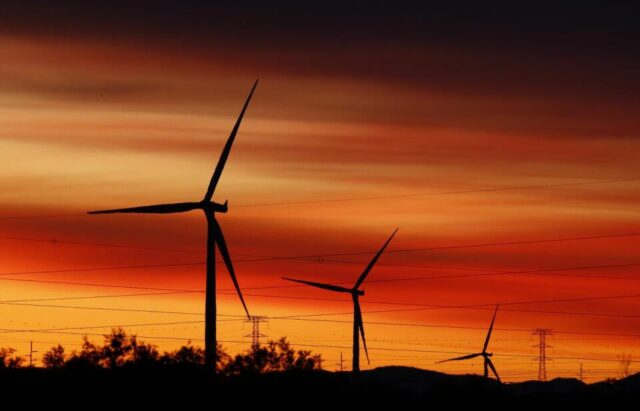The Draft South African Renewable Energy Master Plan has drawn a mixed response after it was released by the Department of Mineral Resources and Energy and the Department of Trade, Industry and Competition.
THE DRAFT South African Renewable Energy Master Plan (Sarem) has drawn a mixed response after it was released by the Department of Mineral Resources and Energy (DMRE) and the Department of Trade, Industry and Competition (the dtic) late on Monday.
Over the past 18 months, the DMRE, working with industry stakeholders, experts, labour and other government departments, produced the Sarem which articulates a vision, objectives, and an action plan for South Africa to tap into opportunities linked to the booming market for renewable energy and battery storage technologies, both domestically and globally, it said in a statement.
It called on stakeholders to review and provide comments on Sarem by July 31.
The South African Wind Energy Association (Sawea) said in a statement on Tuesday that the proposed master plan supported its advocacy for sector industrialisation, through increased local manufacturing and that the key pillars outlined by the document as effective interventions to create a better environment for local manufacturing were clearly defined.
Sawea CEO Niveshen Govender said the fostering of an inclusive development pillar spoke to the sector’s aspirations on transformation objectives, and related to both public and private procurement.
“As such, clear transformation objectives are to be established by developing and implementing a sector specific BBBEE scorecard with specific BBBEE targets to be achieved upon the conclusion of the negotiation process. Local and emerging suppliers will be supported through the development of a transformation fund,” Govender said.
“Whilst the Sarem draft provides a conducive environment for localisation, we’ve noted that responsibility remains with manufacturers to negotiate the investment and associated targets.
“Communities are to be involved through directing renewable energy and storage activities, linked to Just Transition hot spots, indicating that public procurement rounds could be launched in these areas.
“In support of this, Industrial Parks or Special Economic Zones, such as the Atlantis green economy hub, may further be established in these areas to support employment and skills development,” said Govender.
According to the draft Masterplan, South Africa intends to be part of the growth in solar photovoltaic (solar PV) and wind energy technologies that in 2021 globally reached, on average, $0.048 (R0.86) and $0.033 per kilowatt-hour (kW/h), respectively. In South Africa, they similarly reached R0.375 per kW/h for solar PV and R0.344 per kW/h for wind energy technologies in 2021.
Economic dynamics have seen renewable energy costs drop significantly (-88% for solar PV and -68% for onshore wind between 2010 and 2021). According to the document, globally, the renewable energy sector has risen from 18.6% of global electricity supply in 2000 to 28% in 2021.
In 2000, a total of 849GW of renewable energy was installed worldwide.
The contribution of renewable energy technologies to electricity generation (in terawatt-hours – TW/h) increased from less than 1% in 2000 to almost 7% in 2022.
Looking ahead, by 2030 the global renewable energy market is forecast to reach between 5.4TW (based on the existing trend) and 10.8TW (based on what is required to achieve climate goals), as decarbonisation efforts continue and new sources of demand,such as green hydrogen and New Energy Vehicles, arise “In South Africa, the roll-out of renewable energy technologies is similarly set to increase rapidly, as the country aims to achieve energy security for all as well as decarbonise its electricity supply.
“Utility-scale renewable energy and battery storage public procurement of 22.9GW is planned from 2022 to 2030, according the 2019 Integrated Resource Plan (IRP),” reads the draft Masterplan in part.
It said in addition, various spheres of government had plans for extensive rollout of renewable energy, such as the Department of Public Works and Infrastructure (up to 4,000MW, the Gauteng and Western Cape provinces, and the Garden Route Municipality.
Small Scale Embedded Generation installations are also expected to rise significantly in the country, driven by grid electricity price increases,energy security concerns and government support.
The Presidential Climate Commission points to the need to roll out 50 to 60GW of renewable energy, supported by co-located storage, by 2030.
However, a coalition of Truth in Energy and the Izwe Lami Freedom Foundation, which advocates for the use of all energy sources, including coal and nuclear, said that the country was being blind-sided by the need to appease the international community whose economy was on the back of coal.
It said despite worldwide hysteria and the adoption of “with us or against us” polarising positions, there was considerable and continuing scientific debate on the facts and causalities.
It said there was no debate on the enormous sums of money on the table from the industrialised West to induce developing nations, such as South Africa, to abandon its wealth of natural energy resources to focus on foreign renewable energy sources.
“This pressure on us from international interests, is, in our opinion, short-sighted, counter productive and unaffordable for the foreseeable future, although the appeal for many politicians.
“Industrialised nations became rich and developed on the back of coal and other fossil fuels. Now South Africa and others are being pressured to pay the price of forgoing that which these developed nations greedily consumed to become wealthy,” it said.








